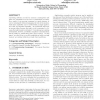103
click to vote
IWMM
2004
Springer
15 years 7 months ago
2004
Springer
Heap size has a huge impact on the performance of garbage collected applications. A heap that barely meets the application’s needs causes excessive GC overhead, while a heap tha...
IWMM
2004
Springer
15 years 7 months ago
2004
Springer
Operating systems account for memory consumption and allow for termination at the level of individual processes. As a result, if one process consumes too much memory, it can be te...
98
Voted
IWMM
2004
Springer
15 years 7 months ago
2004
Springer
Concurrent garbage collectors require write barriers to preserve consistency, but these barriers impose significant direct and indirect costs. While there has been a lot of work ...
110
click to vote
IWMM
2004
Springer
15 years 7 months ago
2004
Springer
Many state-of-the-art garbage collectors are generational, collecting the young nursery objects more frequently than old objects. These collectors perform well because young objec...
117
click to vote
IWMM
2004
Springer
15 years 7 months ago
2004
Springer
We propose a general scheme for creating adaptive replacement policies with good performance and strong theoretical guarantees. Specifically, we show how to combine any two exist...
105
click to vote
IWMM
2004
Springer
15 years 7 months ago
2004
Springer
The goal of the Cyclone project is to investigate type safety for low-level languages such as C. Our hardest challenge has been providing programmers control over memory managemen...
109
click to vote
IWMM
2004
Springer
15 years 7 months ago
2004
Springer
Garbage-First is a server-style garbage collector, targeted for multi-processors with large memories, that meets a soft real-time goal with high probability, while achieving high ...
IWMM
2004
Springer
15 years 7 months ago
2004
Springer
This paper presents a region analysis and transformation framework for Java programs. Given an input Java program, the compiler automatically translates it into an equivalent outp...
IWMM
2004
Springer
15 years 7 months ago
2004
Springer
118
click to vote
IWMM
2004
Springer
15 years 7 months ago
2004
Springer
We document the design and implementation of a “production” incremental garbage collector for GHC 6.2. It builds on our earlier work (Non-stop Haskell) that exploited GHC’s ...




